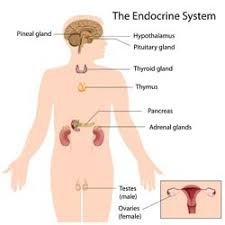Definisi
Endokrinopati adalah istilah medis yang digunakan untuk menggambarkan berbagai macam kelainan endokrin. Sistem endokrin sendiri adalah jaringan kelenjar yang memproduksi dan melepaskan hormon. Setiap kelenjar pada sistem endokrin melepaskan hormon spesifik ke dalam aliran darah Anda lalu menuju ke sel target dan membantu mengontrol atau mengatur banyak proses dalam tubuh.
Kelenjar endokrin meliputi:
- Kelenjar adrenal: 2 kelenjar yang terletak di atas ginjal yang melepaskan hormon kortisol
- Hipotalamus: bagian dari otak yang memberi perintah kelenjar ptuitari untuk melepaskan hormon
- Ovarium (indung telur): organ reproduksi perempuan yang melepaskan sel telur dan memproduksi hormon seks perempuan
- Sel islet pankreas: sel pada pankreas yang mengontrol pelepasan hormon insulin dan glukagon
- Paratiroid: 4 kelenjar pada leher yang terletak dekat dengan hormon tiroid dan memiliki peran dalam metabolisme zat kalsium dan perkembangan tulang
- Kelenjar ptuitari: kelenjar pada dasar otak di belakang sinus, yang mengontrol banyak kelenjar lainnya, terutama tiroid. Gangguan pada kelenjar ptuitari dapat mempengaruhi pertumbuhan tulang, siklus haid, dan pelepasan air susu
- Testis (buah zakar): organ reproduksi laki-laki yang memproduksi sperma dan hormon seks laki-laki
- Timus: kelenjar yang terletak di rongga dada atas yang membantu perkembangan sistem imun pada awal kehidupan
- Tiroid: kelenjar berbentuk seperti kupu-kupu yang terletak pada bagian depan leher dan mengontrol metabolisme tubuh
Penyebab
Endokrinopati umumnya dibagi menjadi 2 kategori:
- Endokrinopati yang disebabkan ketika suatu kelenjar memproduksi terlalu banyak atau terlalu sedikir hormon endokrin. Hal ini disebut dengan ketidakseimbangan hormon
- Endokrinopati yang disebabkan oleh timbulnya nodul atau tumor pada kelenjar endokrin. Meskipun nodul atau benjolan pada endokrin jarang bersifat kanker atau menyebar ke bagian tubuh lain, namun tetap dapat mengganggu produksi hormon dan fungsi kelenjar endokrin terkait
Peningkatan atau penurunan kadar hormon endokrin dapat disebabkan oleh:
- Gangguan pada sistem umpan balik endokrin
- Penyakit tertentu
- Kegagalan dari suatu kelenjar untuk menstimulasi kelenjar lain untuk melepaskan hormon (sebagai contoh, suatu gangguan dengan hipotalamus dapat mengganggu produksi hormon pada kelenjar ptuitari)
- Kelainan genetik, seperti multiple endocrine neoplasia (MEN) atau hipotiroidisme kongenital
- Infeksi
- Cedera pada kelenjar endokrin
- Tumor pada kelenjar endokrin
Beberapa jenis endokrinopati yang paling sering ditemukan meliputi:
- Insufisiensi adrenal: kelenjar adrenal melepaskan terlalu sedikit hormon kortisol dan terkadang aldosteron
- Diabetes: kondisi yang menyebabkan kadar gula darah tinggi akibat tubuh tidak dapat memproduksi atau menggunakan insulin dengan cukup untuk meregulasi glukosa
- Penyakit Cushing: produksi berlebihan hormon kelenjar ptuitari dapat menyebabkan kelenjar adrenal menjadi aktif secara berlebihan. Kondisi yang mirip yang disebut sindrom Cushing dapat terjadi pada orang yang mengkonsumsi obat kortikosteroid dosis tinggi dan dalam jangka waktu lama
- Gigantisme (akromegali) dan gangguan hormon pertumbuhan lainnya. Jika kelenjar ptuitari memproduksi terlalu banyak hormon pertumbuhan, tulang dan bagian tubuh anak dapat tumbuh dengan sangat cepat. Jika kadar hormon pertumbuhan terlalu rendah, seorang anak dapat berhenti mengalami pertambahan berat badan
- Hipertiroidisme: kelenjar tiroid memproduksi terlalu banyak hormon tiroid. Penyebab hipertiroidisme yang paling banyak adalah penyakit autoimun yang disebut penyakit Graves
- Hipotiroidisme: kelenjar tiroid tidak memproduksi cukup hormon tiroid
- Hipoptuitarisme: kelenjar ptuitari melepaskan sedikit atau tidak melepaskan hormon. Hal ini dapat disebabkan oleh beberapa penyebab yang berbeda
- Multiple endocrine neoplasia I and II (MEN I dan MEN II): kondisi genetik langka yang diturunkan. kondisi ini menyebabkan tumor pada kelenjar paratiroid, adrenal, dan tiroid yang menyebabkan produksi berlebihamn hormon tersebut
- Sindrom ovarium polikistik: produksi berlebihan hormon androgen yang mempengaruhi perkembangan sel telur dan pengeluarannya dari indung telur. Ini adalah salah satu penyebab tersering dari ketidaksuburan perempuan
- Pubertas prekoks: pubertas yang berlangsung lebih cepat dari normal yang terjadi ketika kelenjar menyebabkan tubuh melepaskan seks hormon lebih cepat
Faktor Risiko
Setiap kelainan endokrin dapat memiliki faktor risiko yang berbeda-beda, sedangkan beberapa masih belum diketahui pasti faktor risikonya. Risiko terkena endokrinopati dapat meningkat pada orang yang memiliki anggota keluarga dengan riwayat endokrinopati tertentu, orang yang mengkonsumsi obat-obatan tertentu, serta orang dengan penyakit tertentu.
Gejala
Setiap jenis endokrinopati memiliki gejalanya masing-masing.
Gejala diabetes:
- Peningkatan buang air kecil
- Mudah atau sering lapar dan haus
- Penurunan berat badan tanpa disengaja
- Luka yang sulit sembuh
- Kebas atau kesemutan pada tangan dan kaki
- Mudah lelah
- Penglihatan kabur
Gejala hipertiroidisme:
- Detak jantung cepat atau tidak teratur
- Cemas
- Tidak tahan panas
- Keringat berlebih
- Sering buang air besar
- Kehilangan berat badan dengan peningkatan nafsu makan
- Benjolan pada leher
Gejala hipotiroidisme:
- Mudah lelah
- Tidak tahan dingin
- Kulit kering
- Bengkak pada wajah
- Detak jantung lambat
- Konstipasi
- Peningkatan berat badan
Gejala akromegali:
- Tangan dan kaki besar
- Pertumbuhan bagian wajah
- Perubahan tulang, seperti rahang yang menonjol
- Kulit tebal dan kering
Gejala sindrom ovarium polikistik:
- Siklus haid tidak teratur
- Pertumbuhan rambut berlebihan
- Jerawat
- Penipisan rambut
- Peningkatan berat badan dan sulit menurunkannya
Diagnosis
Penegakan diagnosis endokrinopati merupakan suatu proses yang kompleks oleh karena sistem endokrin adalah struktur yang saling berhubungan satu sama lain dalam meregulasi banyak fungsi tubuh yang berbeda, seperti pertumbuhan, metabolisme, dan reproduksi.
Jika dokter mencurigai Anda mungkin mengalami endokrinopati, dokter kemungkinan akan merekomendasikan pemeriksaan spesifik untuk mengonfirmasi diagnosis, seperti:
- Pemeriksaan urin
- Pemeriksaan darah
- Aspirasi jarum halus
- USG
- CT scan
- MRI scan
- PET (positron emission test) scan
Tata Laksana
Tata laksana untuk endokrinopati sangat bervariasi bergangung pada tipe kelainan yang Anda derita, karena setiap jenis penyakit mengganggu sistem endokrin dengan cara yang berbeda.
Terapi dapat meliputi:
- Obat-obatan untuk menyeimbangkan hormon dan mengatasi gejala
- Kemoterapi dan/atau terapi radiasi untuk orang dengan tumor ganas kelenjar endokrin
- Operasi untuk mengangkat tumor pada kelenjar yang mempengaruhi produksi hormon
Komplikasi
Endokrinopati, jika tidak diterapi, dapat menyebabkan kondisi yang mengancam nyawa. Beberapa komplikasi terkait endokrinopati meliputi:
- Detak jantung yang pelan sehingga menyebabkan gagal jantung
- Kelelahan terus menerus
- Kelemahan otot yang menyebabkan kelainan otot dan saraf
- Gangguan pada otak yang disebut ensefalopati, ditandai dengan bingung dan penurunan kesadaran
- Koma
- Stroke
- Gangguan sistem saraf
Pencegahan
Terdapat beberapa cara untuk mempertahankan sistem endokrin yang sehat yaitu:
- Usahakan untuk mengonsumsi makanan sehat dan bergizi, hindari makanan cepat saji maupun makanan dengan pengawet tinggi
- Olahraga rutin dapat memperkuat sistem tubuh Anda
- Kontrol rutin ke dokter untuk membantu Anda mengetahui performa sistem endokrin Anda dan mempertahankan fungsi normalnya
Kapan Harus ke Dokter?
Endokrinopati dapat sulit untuk diidentifikasi akibat gejalanya yang sangat bervariasi dan mirip dengan kondisi lainnya. Jika Anda mengalami gejala yang tidak biasanya yang dapat menandai adanya kelainan endokrin maka Anda harus menghubungi dokter, terutama jika gejala memburuk atau mengganggu aktivitas sehari-hari.
Mau tahu informasi seputar penyakit lainnya? Cek di sini, ya!
- dr. Benita Kurniadi
Tampa General Hospital. Endocrine disorders: Causes & treatment. Available at: https://www.tgh.org/institutes-and-services/conditions/endocrine-disorder (Accessed: February 27, 2023).
WebMD. (2021). Endocrine disorders: Types, causes, symptoms, and treatments. Available at: https://www.webmd.com/diabetes/endocrine-system-disorders (Accessed: February 27, 2023).
MediLexicon International. (2021). Endocrine disorders: Causes, types, and diagnosis. Medical News Today. Available at: https://www.medicalnewstoday.com/articles/endocrine-disorders (Accessed: February 27, 2023).












